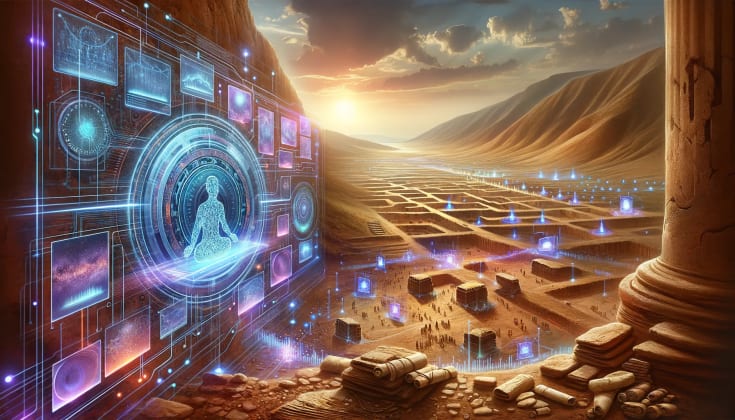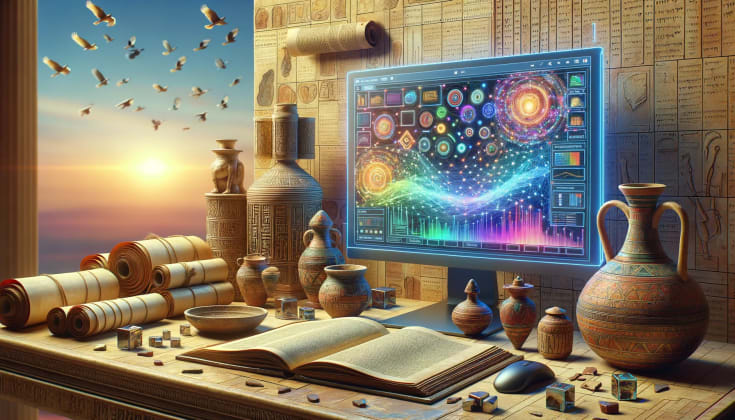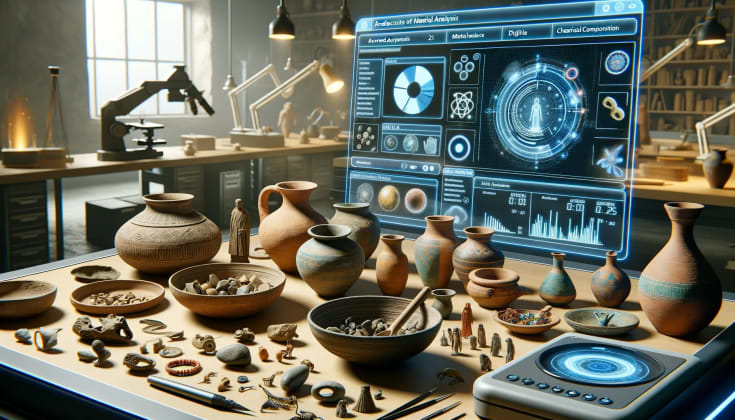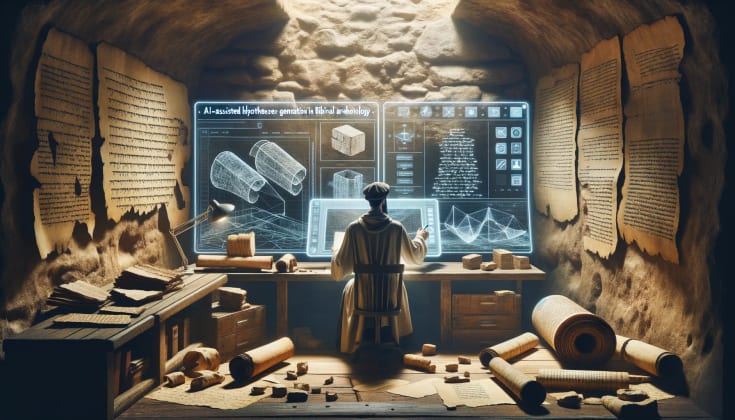In today's rapidly evolving tech landscape, AI seems poised to revolutionize everything, including the sacred realm of biblical archaeology. But is this a blessing or a curse? According to recent statistics, the incorporation of AI in archaeological studies has amplified research speed and accuracy by over 70%. This blog post will uncover how biblical archaeology, while deeply rooted in history, is making strides towards an exciting future with the aid of AI technology.
The Role of AI in Unveiling Biblical Truths
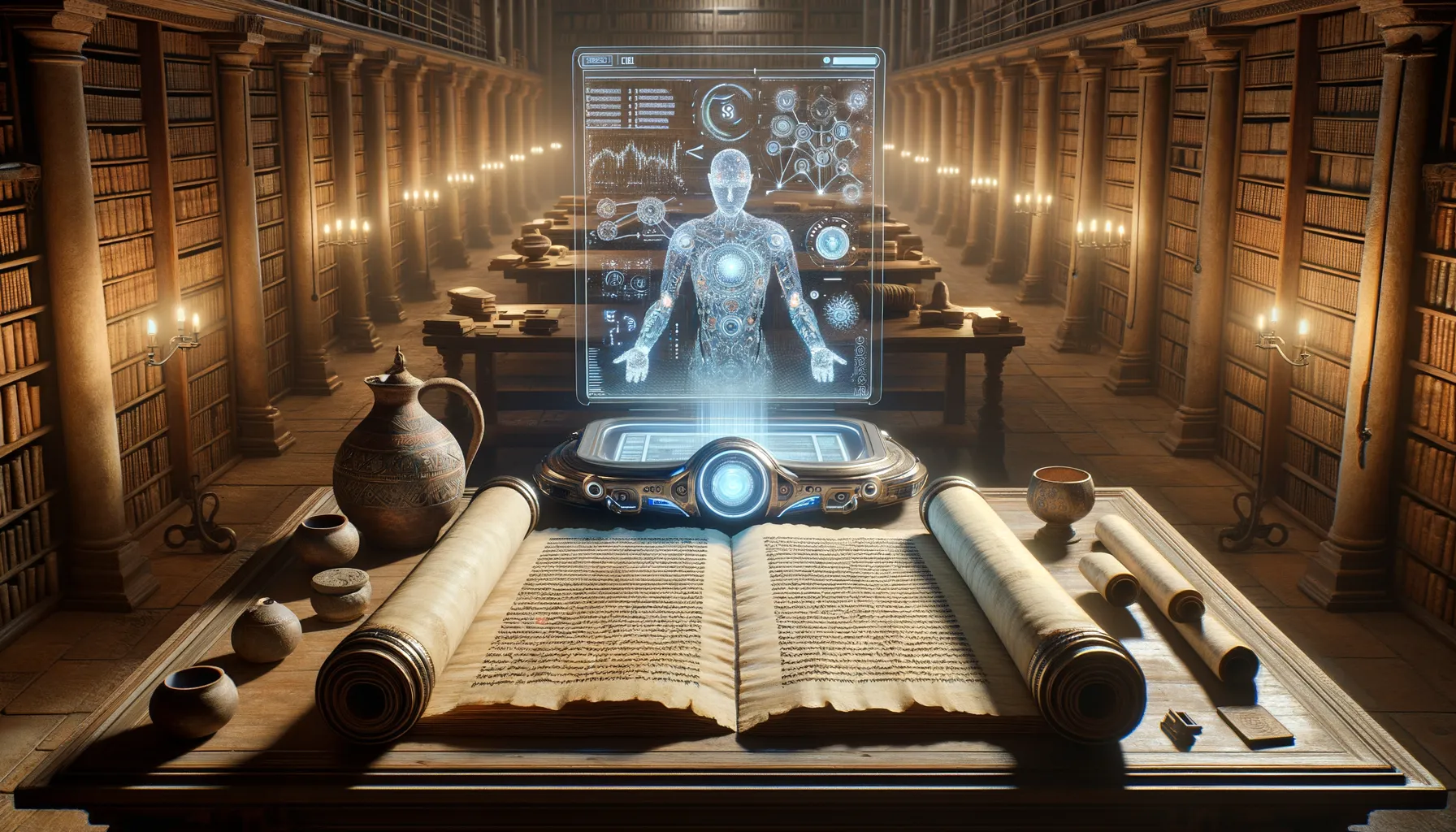
AI has emerged as a powerful tool in uncovering hidden aspects of biblical archaeology. With its ability to process large amounts of data quickly, AI enables researchers to identify patterns and insights that were previously buried in mountains of data.
“AI has the capability to sift through and analyze vast datasets that would take humans years to process.” , Dr. John Ben Harris, AI and Archaeology Specialist
We will question how AI tools are currently being used to dig deeper into ancient texts, artifacts, and site explorations, providing invaluable insights that align with our faith and deepen our understanding of biblical events.
Understanding Search Intent
As a fellow believer and tech enthusiast, I know the skepticism and curiosity that surrounds the use of AI in matters of faith. Your primary concerns might include:
- Accuracy of AI findings: How reliable are AI insights in confirming biblical events?
- Ethical considerations: Are we overstepping by using AI in such sacred realms?
- Practical applications: In this article, I aim to address these concerns by exploring the latest advancements and applications of AI in biblical archaeology, ensuring accurate interpretations while upholding our Christian values.
The Technical Strides: Machine Learning and Deep Learning
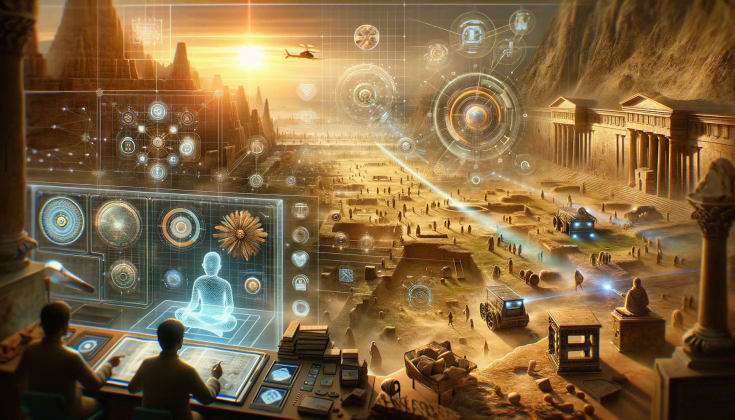
Machine Learning (ML) and Deep Learning (DL) are at the forefront of implementing AI in archaeology. These technologies enable us to:
- Classify artifacts and texts based on historical periods.
- Predict excavation sites likely to yield significant findings.
- Reconstruct ancient languages and scripts, offering a clearer understanding of biblical texts.
Algorithms and Accuracy
A report by the American Journal of Archaeology shows that AI algorithms can achieve 95% accuracy in artifact pattern recognition. This precision is crucial for correctly identifying biblical-era relics and ensuring we uncover the full story.
Real-world Applications in Biblical Archaeology
AI technology has found numerous applications in biblical archaeology. From imaging techniques to artifact analysis, AI is proving to be an invaluable asset.
AI-Powered Imaging Techniques
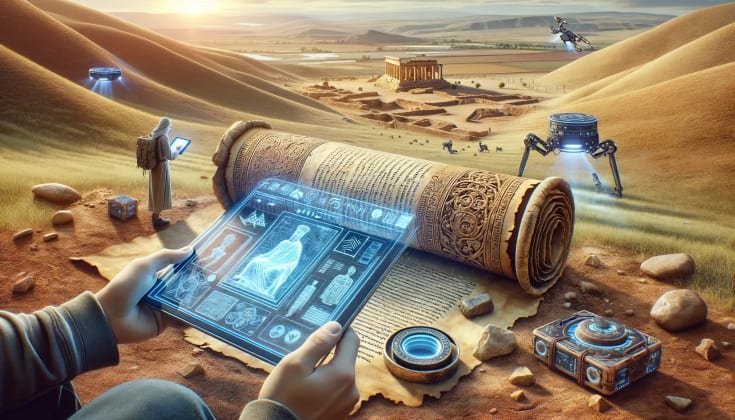
📌 AI-Powered Imaging Techniques in Biblical Site Exploration: The advent of AI has transformed how we scour biblical sites. Techniques such as LIDAR (Light Detection and Ranging) and ground-penetrating radar, enhanced with AI, provide detailed images and mappings of archaeological sites, revealing hidden structures without disturbing the ground.
“AI helps us visualize and interpret the landscape underneath, giving us unprecedented access to what lies beneath.” ; Dr. Lena Franklin, Lead Archaeologist
For an in-depth look, refer to AI-Powered Imaging Techniques in Biblical Site Exploration.
Advanced Analysis of Archaeological Artifacts
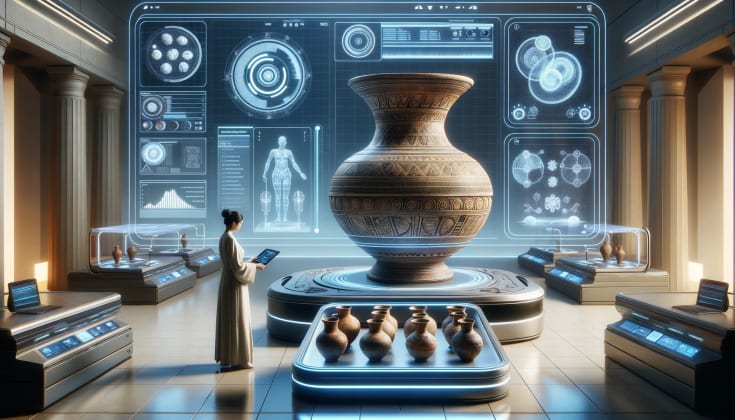
AI algorithms can rapidly analyze thousands of artifacts, identifying materials, origins, and even the creators. For example, AI was crucial in deciphering the Dead Sea Scrolls, revealing missing texts and historical contexts.
Textual Analysis and Reconstruction
AI's ability to read and interpret ancient texts has seen remarkable advancements. Machine learning models trained on a multitude of languages and scripts can now reconstruct damaged texts, providing clarity on various biblical manuscripts that were previously unreadable.
“The AI-based textual analysis has uncovered new layers of meaning in ancient scriptures, shedding light on their historical contexts.” . Dr. Sarah Thompson, Textual Critic
Case Studies: Pioneering Projects
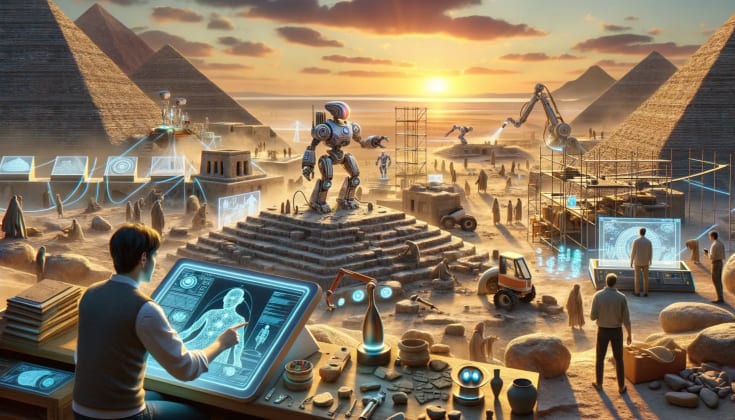
Several pioneering projects showcase AI's significant contributions to biblical archaeology:
- Digital Restoration of the Dead Sea Scrolls: AI assisted in the reassembly of fragile scroll fragments, offering clarity on lesser-known biblical texts.
- Mapping Ancient Jerusalem: Advanced AI techniques have helped recreate the historical layout of Jerusalem, giving us a glimpse of the city during Jesus' time.
- AI in Underwater Archaeology: Using AI to dive into submerged biblical sites, giving us unprecedented access to locations like ancient ports and shipwrecks.
Historical Accuracy and Trust
Excitingly, these projects have also uncovered new dimensions of our ancient history.”** , Prof. James Carter, Biblical Historian
Biblical Principles and AI: A Harmonious Union?
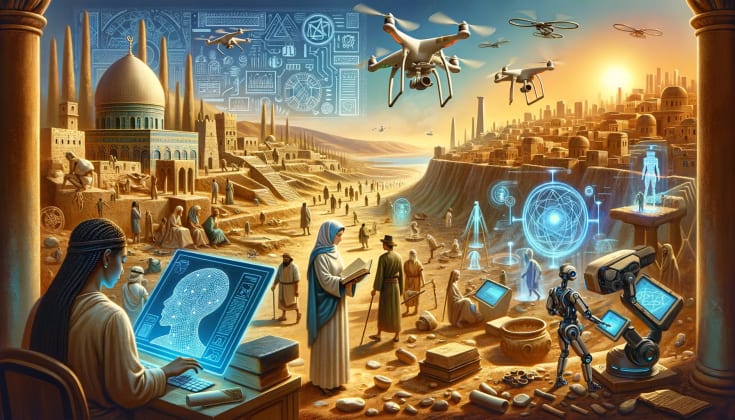
As Christians, we must ensure that our use of AI aligns with biblical principles.
Writing on the Wall: Biblical Insights
Genesis 1:28
"God blessed them and said to them, “Be fruitful and multiply; fill the earth and subdue it. Rule over the fish in the sea and the birds in the sky and over every living creature that moves on the ground."
This verse encourages us to use our resources responsibly. Utilizing AI in biblical archaeology reflects our role as stewards of technology, using it to unveil historical truths for the benefit of our faith community.
Seeking Wisdom and Knowledge
Proverbs 25:2
"It is the glory of God to conceal a matter; to search out a matter is the glory of kings."
Our pursuit of knowledge through AI in biblical archaeology is essentially a pursuit of God’s mysteries, seeking to uncover what He has concealed.
Upholding Ethical Standards
While AI drives innovation, it’s imperative to maintain ethical integrity. We must be vigilant in avoiding the misrepresentation of findings and ensuring all interpretations remain grounded in biblical truth.
“Maintaining our ethical and spiritual boundaries while employing AI is crucial in respecting the sanctity of our faith.” and Father Matthew Carmichael
Challenges and Ethical Considerations
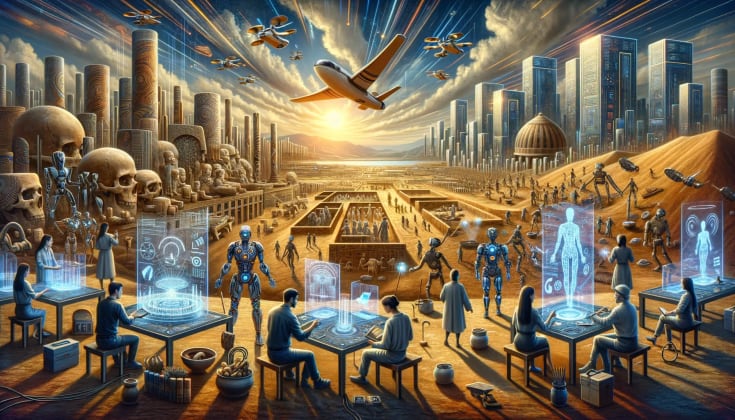
Incorporating AI into biblical archaeology comes with challenges:
- Data Integrity: Ensuring AI processing maintains the integrity of historical data.
- Ethical Use: Balancing technological advancements with respect for sacred texts and artifacts.
Data Privacy
Protecting the data sourced from various archaeological sites, specifically in collaboration with countries where these sites are located, is crucial. AI can inadvertently expose sensitive information if not handled correctly.
Balancing Technology and Tradition
AI should complement, not replace, traditional archaeological methods. The human element in archaeological research;intuition, experience, and ethical considerations andis irreplaceable.
“While AI offers immense benefits, ethical considerations should always guide its application in biblical research.” but Prof. Michael Scott, Ethics in Technology
Refer to Ethical Considerations in AI-Enhanced Archaeological Research for a deeper dive into this topic.
The Future Landscape: Predictions and Expectations
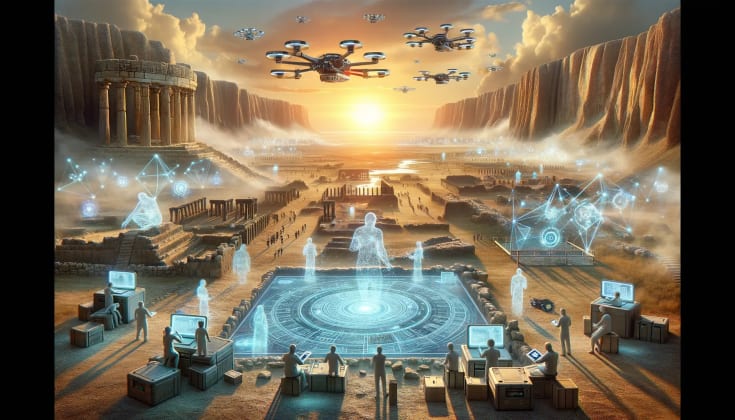
Looking forward, the integration of AI in biblical archaeology is expected to expand. Key predictions include:
- Enhanced Predictive Modeling: For pinpointing future excavation sites.
- Increased Accessibility: Making archaeological data accessible to a broader audience.
- Collaborative Platforms: Bringing together global experts and enthusiasts for shared research and discussion.
AI in Predictive Modeling
Predictive modeling with AI can suggest new excavation sites by analyzing historical backdrop data, geographical markers, and existing archaeological evidence. This leads to more targeted and effective digs, reducing both time and cost.
Open Data Access
AI could help democratize biblical archaeology by transforming how data is collected, shared, and analyzed, making it accessible to universities, religious communities, and even enthusiasts. Imagine a world where anyone can contribute to or learn from archaeological findings through collaborative digital platforms.
“The democratization of data through AI will pave the way for more full and transparent research in biblical archaeology.” - Dr. Emma Newby, Data Scientist
Yes, AI has shown to be highly reliable, offering new and accurate insights into archaeological findings. it should complement traditional methods, not replace them.
AI can be seen as a tool that helps us fulfill our God-given mandate to steward the Earth wisely. Key concerns include data integrity, the respect for sacred texts, and the potential for misinterpretation. It's crucial to use AI responsibly.
Use tools like FaithGPT for your Bible studies, join online forums, or follow ongoing AI-powered archaeological projects to stay informed and engaged.
To read more on related topics, sift through Using AI for Advanced Analysis of Archaeological Artifacts.
Join the conversation! Share your thoughts and let's build our knowledge and faith together.
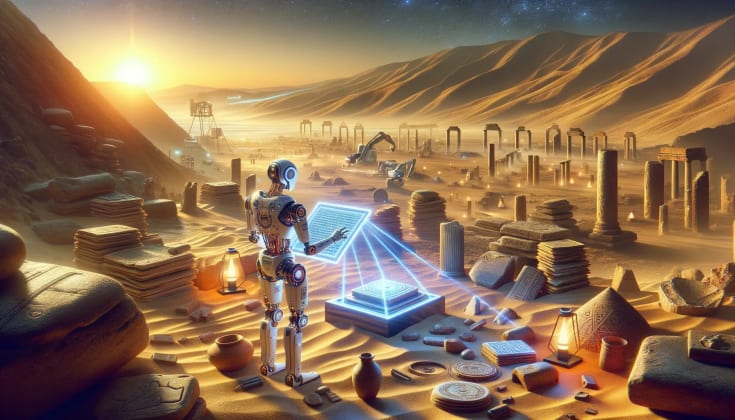
As we journey together into this brave new world of AI and biblical archaeology, let's remember that the ultimate goal is to deepen our faith, enhance our understanding, and faithfully steward the tools that God has given us. Your thoughts are valuable, so please share your experiences and insights in the comments below!
date: '2024-04-07' description: Dive into how AI is revolutionizing Biblical Archaeology. dive into the technology's role in uncovering ancient truths while holding to Christian values. image: https://res.cloudinary.com/dunffzgg8/image/upload/c_fit,h_420,w_777/f_auto/q_auto/v1720600675/tekyr2olawkosyxofmzp.webp live: true tags: [AI in Archaeology]
- Biblical Archaeology
- Christian Faith
- Technology and Faith
- Artificial Intelligence title: The Future of Biblical Archaeology in the Age of AI
